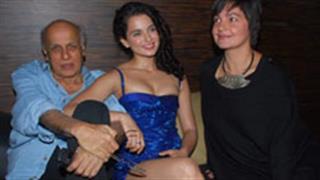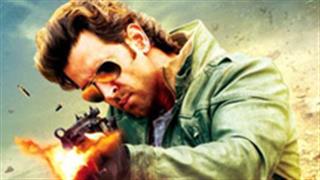Handling a confrontational story set in Kashmir means walking a tightrope between catering to jingoism and risking the 'anti-national' tag. Vishal Bhardwaj explains how he balances that in Haider.
After you finished Haider, and started the phase of promotions, three Kashmir-centric events of a fairly high visibility happened. One, the floods, and the relief operations, within which you had episodes such as Yasin Malik's asking people to not take the Army's help. Two, Bilawal Bhutto declaring that he would "take Kashmir back" - yet again proving that the easiest way for a politician to trend online is to make one grand declaration on Kashmir.
Thirdly, Nawaz Sharif and Modi speak at the UN General Assembly and the usual expected statements on plebiscite and exported terror are exchanged. Kashmir perspectives tend to be very fixed - 'traitors', 'motherland', 'terror', 'brutality', 'saviours', and such catchphrases start playing in all debates. How do you view or consume these developments differently after having spent this much time understanding the Kashmir story?
Actually, it's important to see it in its reality. What I have attempted to do is observe the life of a common family in Srinagar. And my film is set in a period, in 1995, when militancy was it at its peak. What a middle class family in Kashmir goes through in a time of conflict. How a family that doesn't belong to either side, that wants to live a normal life, how that family gets sucked into all this is my story. Politics is a backdrop, a very strong backdrop, but finally I am exploring the story of a family. Mujhe jo lagta hai, ki jo abhi tak hamari filmein mostly Kashmir pe bani hain, humnein almost always baahar se jaa kar dekha hai. We haven't seen it from the other side. What is the viewpoint of the people who have lived over there, what they have gone through - that has not been taken up. Sometimes we see it from the view of an intelligence officer, sometimes from the viewpoint of a journalist, sometimes it could be the story of a South Indian lady who is attempting to find her husband. That is the way the filmmaker likes to access what he thinks he can actually be closest to. I did not want to do that. Which is why I hadn't taken this up earlier, even though I'd wanted to make a movie on Kashmir for many years.
Why?
Because it's a conflicted state. It is a human tragedy. And a filmmaker is always interested in reflecting the times he lives in. For the past 25 years, I have grown up in the shadow of these conflicts - first Punjab and then Kashmir. Punjab finally stabilized, and perhaps people expected Kashmir to, as well, and there is a thought ki militancy ki age hoti hai, 10 years, it will finish. But it has been more than 20 years and the militancy in Kashmir is not finishing. I read the book by Basharat Peer, his memoirs of growing up in the 90s, and I found a lot of insight in that. So I took him up as my co-writer, we adapted Hamlet to that, and that's how my Kashmir film finally came into being.
Suppose you were called to take part in a TV debate on Kashmir, and asked to comment on local people being asked to boycott help from the Army by the likes of Yasin Malik amid very heated opinions. What would you say?
I don't think these questions were there in the first two or three days when the situation was really bad. They began to come up later. When things are really tough, I don't think it is about who is an Armyman and who is a separatist. It is about the basic value of human life and of saving that life. I think that sort of debate is an afterthought. I am not sure of who said what, but I think it was an afterthought, that question. In reverse, I remember seeing TV and Mirwaiz Umar was on TV and they were somewhere in Kashmir University, I think, and they were saying we need more boats. And at that time I think it was very insensitive on the part of a journalist who asked Mirwaiz, now do you feel gratitude towards the Army? I mean, what a time to ask that! Isn't it insensitive for us to ask that? Dekhiye hum aap ke liye kitna kar rahe hain. Aap unko apna maante hai na? Phir ehsaan jataane ki zaroorat kyun? And the thing is that the Army, which is actually doing the work, is not making a show of doing a favour. The Army has blinders - it keeps out of politics, does its work and goes back. Problem shuru hoti hai when politics enters areas such as flood relief and then the media tries to sensationalize things. These are times to win people over, not score points. And from what I have seen, there is a lot of respect for the Army there, it has done a lot of work.
You are setting the story in 1995, and you are shooting in Kashmir for that story in 2014 - when it has moved ahead about two decades. How much of a change did you notice from 1995 when you spent time in Kashmir now?
Elections have happened many times since then. Militancy is much lesser than what it was at its peak. And the common Kashmiri is fed up. Their business has been very badly affected amid all this. I think they want to live a normal life - yeh mujhe laga.
When a filmmaker makes a movie where the concept of 'Hindustan' has a key role to play, isn't it easier to make something like a Gadar - no shades of grey, the hero effortlessly uproots handpumps and wins against everyone because he's a hot-blooded patriot? If a movie, in trying to tell both sides of a story, has shades of being 'anti-India', it's likely to cause angst as well as censor troubles.How do you walk that tightrope? How does a creative individual work his way around the jingoism of the mass audience?
I'm also an Indian, I'm also a patriot, I also love my nation. So I won't do anything which is anti-national. But what is anti-human, I will definitely comment on it. That is what I have done in the film as well. I am definitely not anti-national, I am only against what is anti-human. I have had not a single objection raised to any scene, any dialogue in my film being cleared (by the CBFC).
Vishal Bhardwaj is not anti- national, but says all about what's anti-human
Tuesday, September 30, 2014 15:03 IST




















